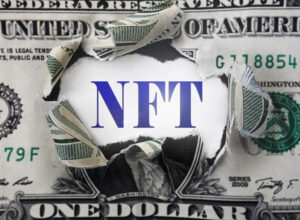One of the more fascinating IP stories of 2021 is unfolding before our eyes, tying together the disparate strands of patents and copyrights with the unbelievable market focus on monetization of blockchain technology. On May 27, 2021, UC Berkeley announced that it was jumping on the Non-Fungible Token (NFT) bandwagon, with an upcoming auction on June 2, 2021, of patent invention disclosures owned by the university that are tied to Nobel Prize-winning inventions. With proceeds going to fund continuing research, the effort by Berkeley is clearly intended to capitalize on the frothy market for NFTs of all stripes, led by the notorious sale of a Beeple NFT for nearly $700 million and the sale of NBA highlights on NBA Top Shot for hundreds of thousands of dollars each.
I freely admit that I could benefit from a deeper understanding of NFTs and how we got to this point, where a major research university is promoting an auction of patent invention disclosure NFTs. I know enough to realize that Berkeley is not actually allowing a buyer to purchase any of the underlying patent rights and that, if there is a market for the NFTs, it behooves Berkeley to try to bring some money in from them. At the same time, I believe that I and this audience can benefit from hearing from a lawyer with deep experience in this area, who has published on the topic and is actively representing clients working on NFT platforms and projects. Thankfully, I found one, and he has graciously agreed to share some insights with this audience.
My interviewee is Jeremy S. Goldman, a partner at Frankfurt, Kurnit Klein + Selz PC with more than 15 years of experience counseling clients and litigating disputes primarily in the media, entertainment, and technology industries, with significant subject matter expertise in intellectual property, First Amendment, contract, business, and partnership law. Jeremy leverages his background as an early digital native and lifelong computer whiz to advise clients on novel issues at the intersection of IP and technology. He helps clients design and execute IP protection strategies and is a lead counselor on NFTs, representing platforms and creators in this exciting new field. An extensive writer and speaker in these areas, The Legal 500 has recognized Jeremy for his work on high-profile copyright and privacy matters.
Despite his busy practice, Jeremy was kind enough to agree to this interview, which I am honored to present to this audience.
As usual, I have added some brief commentary to Jeremy’s answer below but have otherwise presented his answer to my question as he provided it.
GK: How did you become an NFT lawyer?
JG: My NFT practice is the culmination of a few life trajectories. I got into computers and networking at a very young age and discovered the Internet long before most people had heard of it. I spent the late 90s working at Internet startups, which is when I learned about this new law called the Digital Millennium Copyright Act. I decided to become a lawyer, and for the past 15 years have been an IP, media, and entertainment litigator who also counsels clients on legal issues at the intersection of technology and law.
At the beginning of this year, my law school classmate and blockchain guru, Professor Aaron Wright, tipped me off about NFTs before they went mainstream and caught the interest of the wider legal community. As a lifelong technologist and IP lawyer, I immediately recognized NFTs’ potential to serve as an incredible new vehicle for intellectual property. I published a Primer on NFTs and Intellectual Property, which went pretty viral — at least for a legal piece. Because of my background, I find I’m able to bridge two worlds by explaining IP and legal concepts to the blockchain community and blockchain concepts to the IP and legal community. I’ve now had the opportunity to work with dozens of existing and new clients on their NFT and blockchain-driven platforms and projects.
GK: What a great story of how Jeremy’s disparate experiences and talents have led him to focus on this exciting new area. As for his publication, I feel lucky to have stumbled on Jeremy’s primer in my LinkedIn feed. It has been fascinating to see the media stories about big-ticket NFT “sales” and the primer does a wonderful job of highlighting the various IP issues arising as a result of the market popularity of NFTs. Read it — you will learn something.
GK: What is an NFT?
JG: NFT stands for Non-Fungible Token. At its most basic level, an NFT is a digital asset associated with another object, typically a digital one. The ownership of an NFT is recorded on a blockchain (Ethereum is the current leader), which is a list of transactions — like a ledger — distributed and replicated across multiple networked computer systems. Blockchain transactions are immutable, meaning there’s no undo button. Unlike cryptocurrencies, which are fungible tokens traded on blockchains, each NFT is unique because of its reference to a particular object.
NFTs have been created for an ever-expanding list of new and existing intellectual property, including digital and programmable art, collectibles, video game assets, sporting moments, virtual real estate, music albums, Tweets, fast food, memes, and more. NFTs are typically purchased with cryptocurrency (like Ether) and stored in cryptowallets (like MetaMask).
What makes NFTs special is that they enable scarcity — or at least the perception of scarcity — of digital objects, which to date have been defined and plagued by the ease of their replication and proliferation (think Napster). While anyone can view and download a piece of digital art, only one person may be on record as the owner of the NFT connected to that object. For the same perplexing reasons that humans ascribe value to other rare objects, people have ascribed value — sometimes millions of dollars’ worth of value — to certain NFTs. There are now dozens of marketplaces, auction houses, and specialty shops that deal in NFTs, with more platforms and projects popping up daily.
GK: Perplexing is a great word to use when we think about some of the recent economic activity associated with NFTs. But even if we don’t fully understand the market appeal, informed IP lawyers would do well to learn about the topic. Whether the NFT phenomenon has legs may be an open question, but as Jeremy implies, the daily arrival of more NFT-focused platforms and projects demands our current attention.
Next week, we will hear from Jeremy about what IP and other legal issues are implicated by NFTs.
Please feel free to send comments or questions to me at gkroub@kskiplaw.com or via Twitter: @gkroub. Any topic suggestions or thoughts are most welcome.
Gaston Kroub lives in Brooklyn and is a founding partner of Kroub, Silbersher & Kolmykov PLLC, an intellectual property litigation boutique, and Markman Advisors LLC, a leading consultancy on patent issues for the investment community. Gaston’s practice focuses on intellectual property litigation and related counseling, with a strong focus on patent matters. You can reach him at gkroub@kskiplaw.com or follow him on Twitter: @gkroub.










 Kathryn Rubino is a Senior Editor at Above the Law, and host of
Kathryn Rubino is a Senior Editor at Above the Law, and host of 




 Jordan Rothman is a partner of
Jordan Rothman is a partner of 




